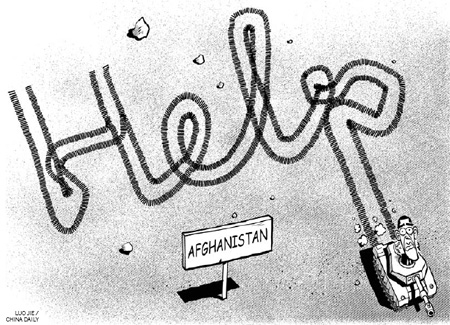Op-Ed Contributors
US can't be lone ranger in Afghanistan
By Yang Hongxi (China Daily)
Updated: 2010-04-02 06:34
 |
Large Medium Small |
Editor's note: The US has addressed its newfound counterterrorism strategy, but the lack of coordination from countries in that region and the reviving rampant terrorist attacks, make the new strategy likely to suffer future setbacks.
United States President Barack Obama's surprise visit to Afghanistan in late March makes one thing very clear: the Obama administration has a newfound counterterrorism focus on Afghanistan and Pakistan.
But though Obama said his strategy will address "both the symptoms and root causes of terrorism" in Afghanistan, military action still dominates the current campaign. That worries Afghanistan's neighbors, namely countries in Central Asia, Russia and Iran.
| ||||
Currently, there are 68,000 US troops stationed in Afghanistan. That number will increase to 100,000 at the end of Obama's presidency. In addition, NATO's 25 member countries promised a reinforcement of 7,000 soldiers. Protecting the supply lines for the troops will be a tough task, given the increasingly frequent attacks launched by terrorists in Pakistan and its adjacent area with Afghanistan. The Taliban has also been using Pakistan as a base to strike inside Afghanistan.
Due to the fear that the direct stationing of US forces in Pakistan would intensify domestic conflicts, thus threatening and pressuring the current regime, Islamabad hasn't allowed for US troops to launch direct military action against terrorists hiding in Pakistan.
During the second half of 2009, a series of virulent terrorist attacks struck Afghanistan and Pakistan, which tells us that terrorist groups are rallying to strike back against US forces and its allies from the periphery. So, without question, the US counterterrorism action in Afghanistan will encounter more difficulties and is highly likely to suffer future setbacks.
The deteriorating situation in Afghanistan highlights where Central Asian countries stand on this issue. Washington expects countries in Central Asia to assist in addressing the protracted Afghanistan issue, especially protecting the transport of supplies for the US and NATO forces in Afghanistan. This transportation line becomes extremely important given the frequent attacks on other important lines passing through Pakistan. The only military base in Central Asia that the US uses to station its forces and materials for the fight in Afghanistan is the Transit Center at Manas International Airport in Kyrgyzstan.
The first step for the US to implement its Central Asian strategy is to address the Afghanistan issue, and a stable Afghanistan is in the interest of Central Asian countries. Obama believes that the priority of the US foreign strategy is to end the Iraq war and then shift its forces to Afghanistan to chase after Al-Qaida and the Taliban.
As Washington changes focus, Moscow is striving to maintain its sphere of influence and strategic interests. Following the Central Asia visit by David Petraeus, the commander of the US Central Command, Russian President Dmitry Medvedev visited Uzbekistan in January 2009 and held the summits of the Eurasian Economic Community (EURASEC) and the Collective Security Treaty Organization (CSTO), both of which are made up mostly of Central Asian countries, in Moscow in February. Russia continues to pressure Kyrgyzstan to close the Manas airbase and renovate its own Kant airbase, 30 kilometers outside the capital Bishkek.
Both Russia and the US are practicing self-restraint and neither wants to see their relationship in tatters. Both sides are maintaining strategic talks but are also looking to ease any worries that either country may have. Meanwhile, Iran is becoming increasingly influential in the changing situation in Afghanistan and Central Asia. Iran shares a long frontier line with Afghanistan and the populous Tajik people living in Afghanistan have the same origins as the Persians. These conditions are conducive for Teheran to influence Afghanistan. The Afghanistan situation has become an important bargaining chip for Iran to improve its relationship with the US, which Teheran has made absolutely clear on many an occasion. The Obama administration has many misgivings about making peace with Iran, which has disappointed Teheran. What is ideal is for Iran to lend the US a hand in dealing with terrorism in Afghanistan before the Obama administration makes a complete U-turn in its policy on Iran.
The author is a researcher with the Contemporary World Research Center. The article first appeared in the Journal of China Social Sciences

(China Daily 04/02/2010 page9)













